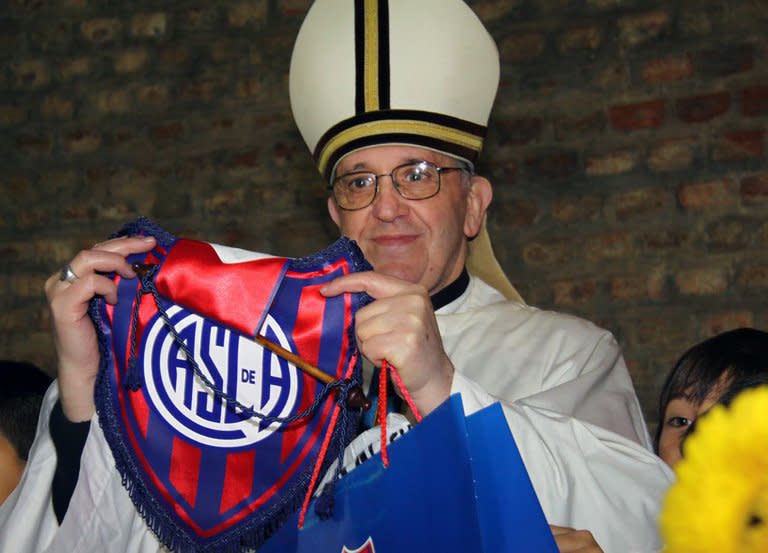Pope Francis: A pastor with the common touch
Latin America's first pope, Jorge Mario Bergoglio of Argentina, combines conservative views with a common touch that endeared him to his parishioners in Buenos Aires, where he grew up as the son of working-class Italian immigrants. Pope Francis lived in a small apartment in the Argentine capital instead of the palace that went with his job as archbishop and rode the city's clattering buses, shunning the perks associated with high office. Bergoglio has spent almost his entire career in Latin America -- far from the intrigue of the Vatican bureaucracy which many Church figures say badly needs reform. Although he fought to stop the Church from siding with the leftist opposition during Argentina's military dictatorship in the 1970s and 1980s, the choice of Bergoglio has been hailed by anti-poverty activists. The 76-year-old -- the first non-European pope in nearly 1,300 years -- has a reputation for being accessible and has been a leading voice on the side of the dispossessed in Argentina's economic crisis. Bergoglio is "a voice of conscience" and "a potent symbol of the costs globalisation can impose on the world's poor," said John Allen, a Vatican expert at the National Catholic Reporter in the United States. Like his predecessor Benedict XVI, he has hit out at the International Monetary Fund and at modern market capitalism -- a stance that could make him an important voice in austerity-ridden Europe. Bergoglio's choice of the papal name Francis is also a first and was seen as a non-traditional choice as it honours a 13th-century saint who famously shunned the riches of his family and lived a simple life in Assisi. "He's very much a pastoral priest, close to the people. He chose the name to refer to St Francis of Assisi, who renovated the church and was a man of humility, poverty and dialogue," his former spokesman Gustavo Boquin said. At his first public appearance on the balcony of St Peter's Basilica on Wednesday, the newly-elected pope appeared in simple white vestments without the gold cross and elaborate robes worn by his predecessor Benedict when he was elected. The new pontiff is a lover of opera and a fan of literary giants like Jorge Luis Borges and Fyodor Dostoyevsky, as well as an ardent supporter of Buenos Aires football club San Lorenzo. He is an early riser too -- waking at 4:30 am -- and is known to have little social life. Unlike most Argentines, who often dine at 11:00 pm, he goes to bed at 9:00 pm. Pope Francis is seen in Argentina as ideologically mainstream, while the Jesuit religious order he belongs to are regarded as one of the most progressive Church institutions. One of his first acts as pope on Thursday was to visit a basilica in Rome where the founder of the Jesuit order, St Ignatius of Loyola, celebrated his first mass as priest in 1538. Sergio Rubin, religion writer for the Buenos Aires newspaper Clarin said Bergoglio however has been controversial among left-leaning Argentines for his rejection of liberation theology -- a leftist inspired current in the Church. Bergoglio was born on December 17, 1936. His Italian emigrant father worked on the railways. The future pope attended a state-run school before earning a degree in chemistry. When he graduated aged 22, he joined the Jesuit order and took a degree in philosophy. He followed this with theological studies and was ordained in 1969. He has studied in Chile, and also in Germany. Analysts said that being from Latin America, having Italian roots and studying in Germany may have worked in Bergoglio's favour in the conservative-minded conclave of cardinals -- which many had thought would choose a European. He was only 36 when he was named to lead Argentina's Jesuits, a job he held for six uncomfortable years under the country's military dictatorship. Bergoglio battled to prevent Jesuits from joining the liberation theology movement, which drew many of the continent's Catholic priests into political activity in opposition to right-wing governments. He has nevertheless, from time to time, clashed with authority. "We live a scandalous situation of poverty and disease and everything leads to a lack of justice," he once declared, during the administration of late president Nestor Kirchner, husband of the current leader, Cristina Kirchner. Following Nestor's death in 2010, Bergoglio grew closer to the new President Kirchner and in particular approved of her opposition to the legalisation of abortion, while clashing with her over attempts to legalise gay marriage. When Argentina became the first Latin American country to permit same-sex marriage in 2010, he was furious. "Let's not be naive," he declared. "This is not just a political struggle. It is destructive to God's plan." But he has shown signs of more openness too. Last year he criticised priests who refused to baptise children born out of wedlock saying this was a form of "rigorous and hypocritical neo-clericalism". He has also shown mettle as an evangelist, criticising a "self-referential" Church -- a vital asset for the Church as Catholics desert the faith across Europe. Sergio Rubin, who wrote a book of interviews with Bergoglio entitled "The Jesuit", said he was "conservative at the level of doctrine, and progressive on social issues." Pope Francis, he said, would "renovate the Roman Curia" -- the intrigue-filled Vatican bureaucracy and "breathe new life into the Church". He was one of the favourites at the 2005 conclave which elected Germany's Joseph Ratzinger as Benedict XVI. Media reports at the time said Bergoglio had come a close second, setting him up for this year's historic vote.




